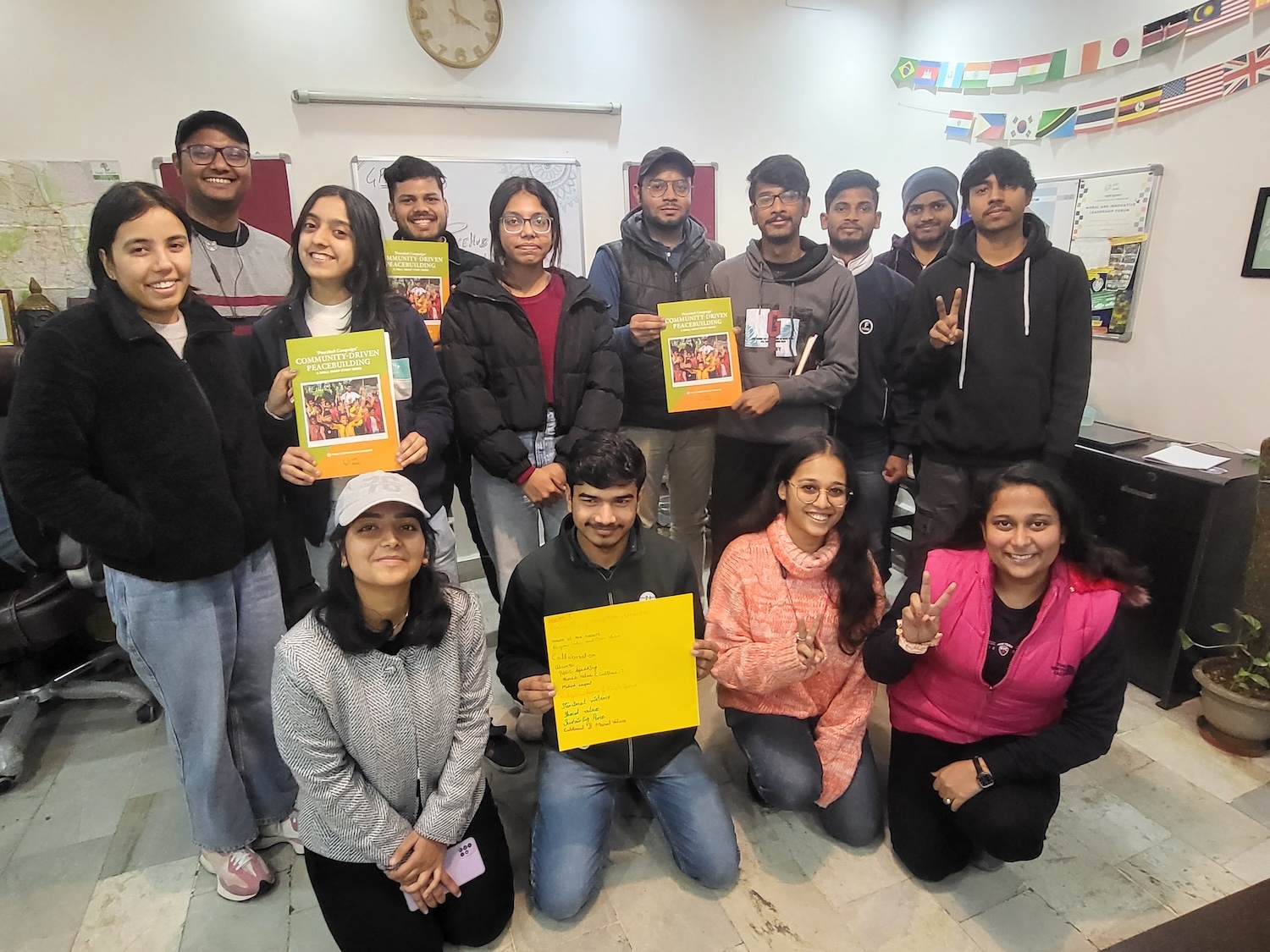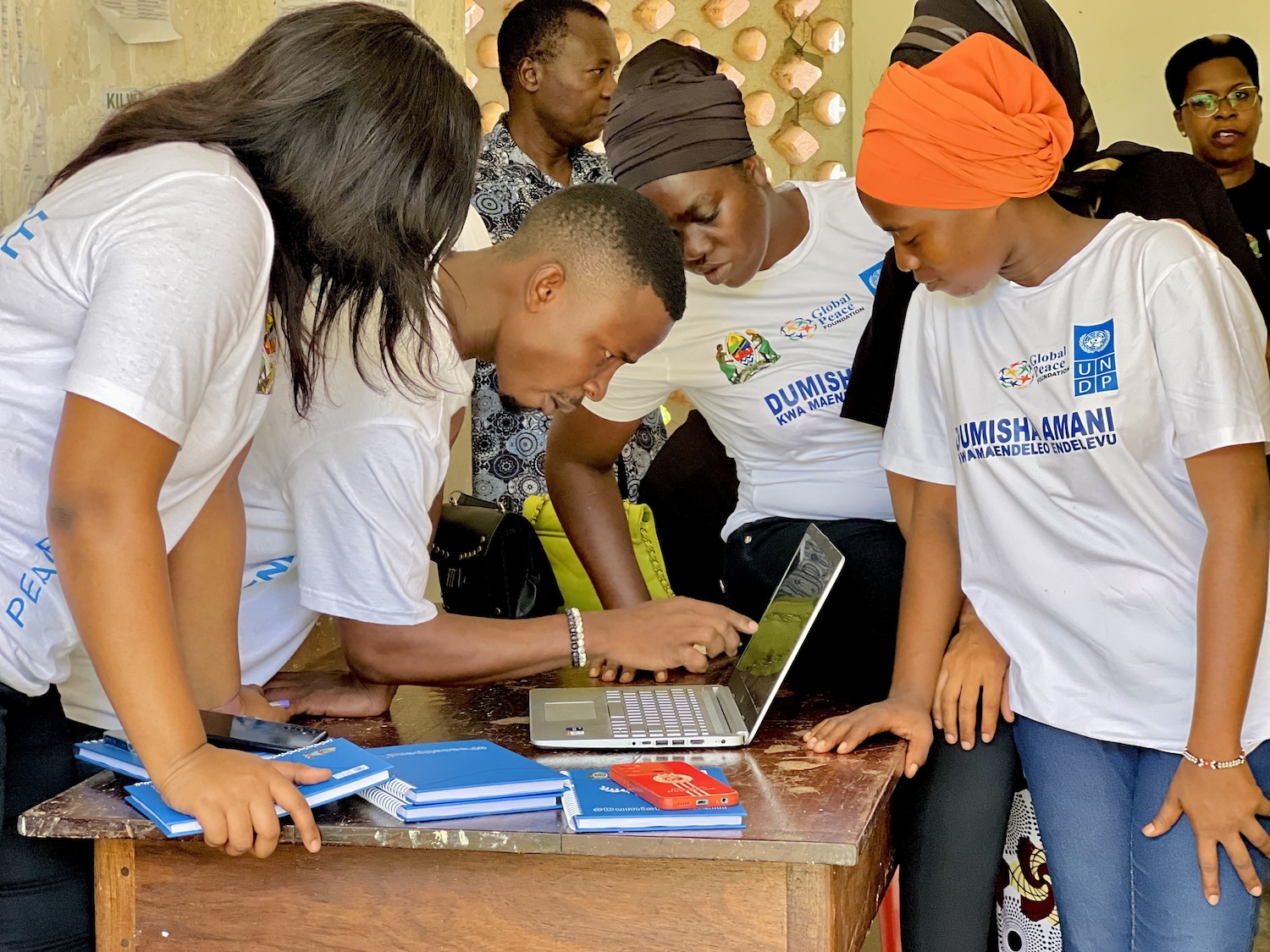Tools for Social Cohesion, Interfaith Action, and Unity
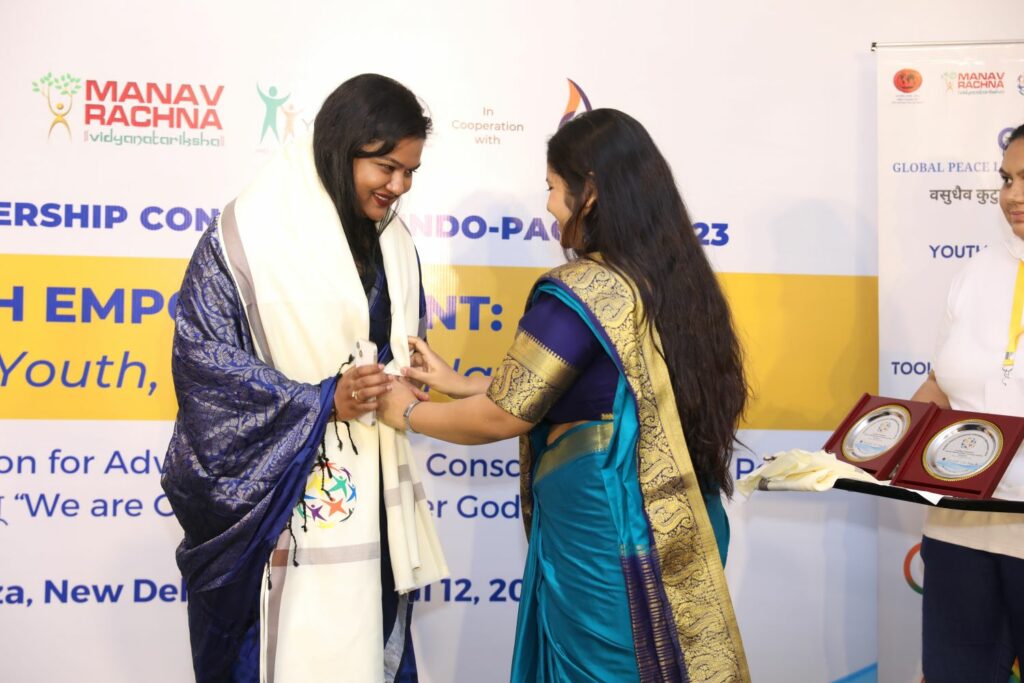
Chairperson of the combined Session III Aditi Naryani Paswan, (Y-20 Youth Leader Track Chair) receives a gift shawl.
The ethos expressed in “Vasudhaiva Kutumbakam,” the vision of the one human family, offers a compelling foundation for peacebuilding. The world’s faith and wisdom traditions agree on universally recognized principles, shared values, and time-honored truths about the intrinsic value, dignity, and fundamental rights of all people which are essential for ethical and cohesive societies. The Values-based Peacebuilding Track examined effective models, best practices, and practical tools for applying these ideals in educational programs, youth leadership development, and community-based peacebuilding.
Session I: Our Common Humanity: Building Social Cohesion Through Shared Values
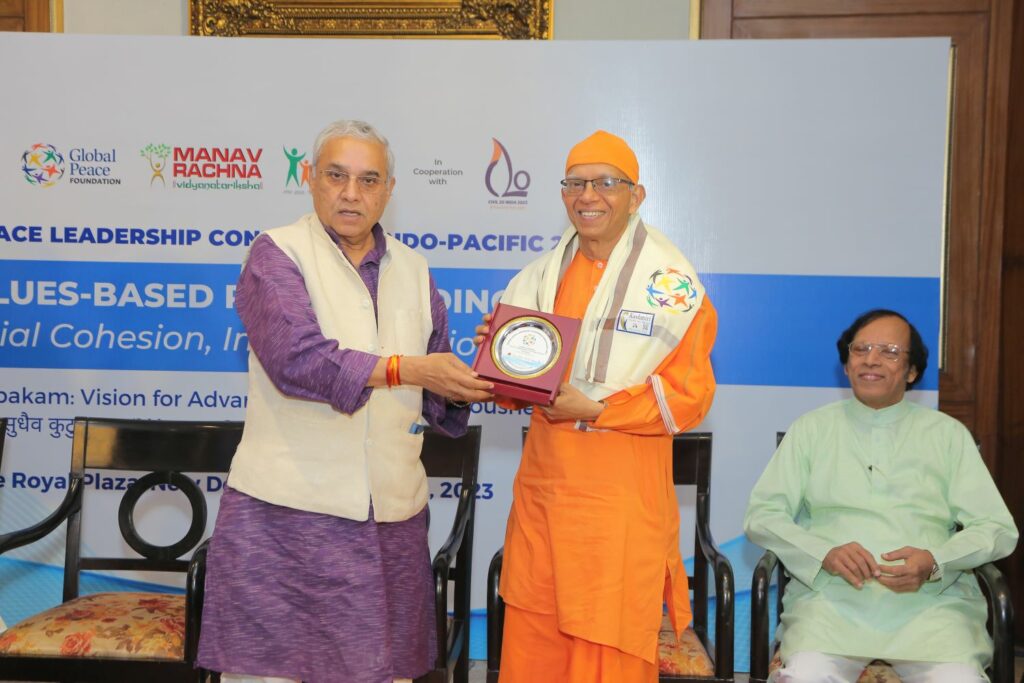
Dr. Markendey Rai presents a token gift to Swami Shantatmananda, Secretary, Ramakrishna Mission.
Vasudhaiva Kutumbakam is a profound Vedantic thought from the Maha Upanishad, an ancient Indian scripture. Mahatma Gandhi’s Ahimsa (non-violence) as a creed and a strategy is considered an extension of Vasudhaiva Kutumbakam, envisioning the unity of humankind as one family. The ideals implicit in Vasudhaiva Kutumbakam are universal and hence resonate globally in other cultural expressions.
Like Vasudhaiva Kutumbakam, another moral imperative that further expresses the ethos of compassion and the oneness of all is the Golden Rule. These ideals are similarly expressed in the African ethos of Ubuntu, the Indonesian ethic of Pancasila, and the ancient Korean ideal of Hongik Ingan, among others, and encapsulated in the expression that we are all one family under God.
“Family is the most sacred space on earth….Vasudhaiva Kutumbakam is inviting us to that understanding.”
—Dr. M. D. Thomas, Institute of Harmony and Peace Studies
Session I explored these universal principles in terms of a civilizational framework and how they are expressed in civil society. Dr. Markandey Rai, President of the Foreign Affairs Committee, Indian Council for International Cooperation (ARSP), chaired the session and Rev. Fr. Canice Chinyeaka Enyiaka served as moderator. Session I speakers included Swami Shantatmananda, Secretary, Ramakrishna Mission, New Delhi, India; Dr. M. D. Thomas, Institute of Harmony and Peace Studies, New Delhi; Dr. Jin Shin, Professor at Chungnam National University, Seoul, South Korea; and Dr. Binny Sareen, Founder and President, Global Initiative for Peace and Wellbeing, New Delhi, India.
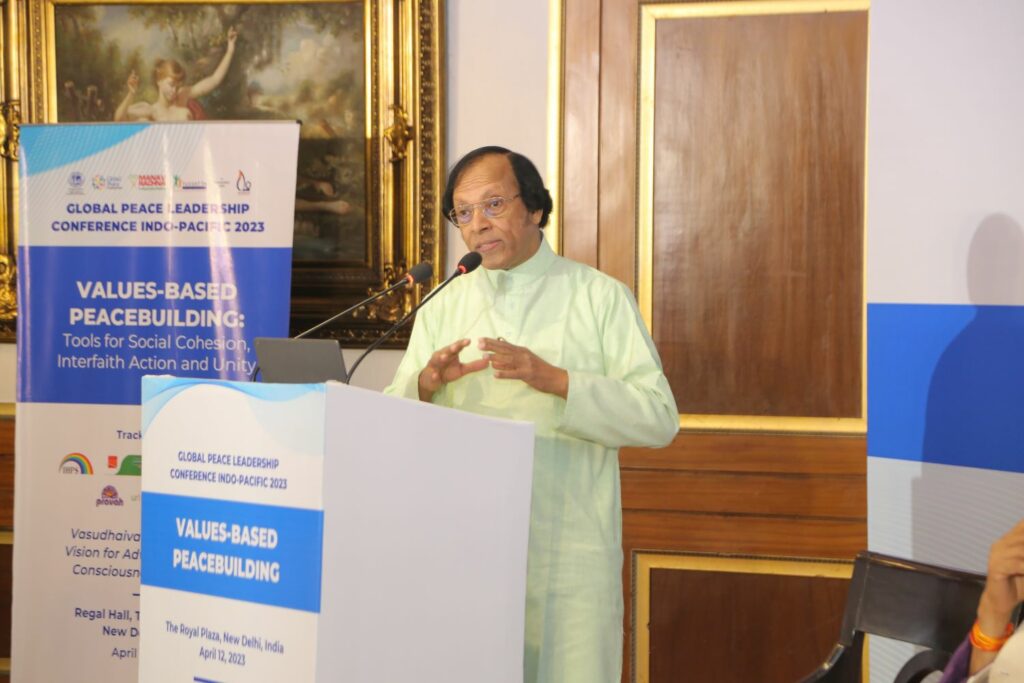
Dr. M. D. Thomas, Institute of Harmony and Peace Studies, addresses Session I.
Session II: Living as One Human Family: Effective Methods and Lessons Learned from the Field
The challenges of living according to such universal principles as Vasudhaiva Kutumbakam can most effectively be addressed at a local level by community and faith leaders who are best positioned to resolve conflicts and provide a path to peace and non-violence. Basic human values – respect and compassion for all people, honoring the family, and living with integrity – are vitally important to people of all faiths and backgrounds. Thus, it is essential that faith leaders stand together and advocate for such time-honored principles and shared values in society at large as peacebuilders. This session examined best practices, helpful tools, and models based on shared values that provide an affirmative basis to build social cohesion in diverse and multireligious societies.
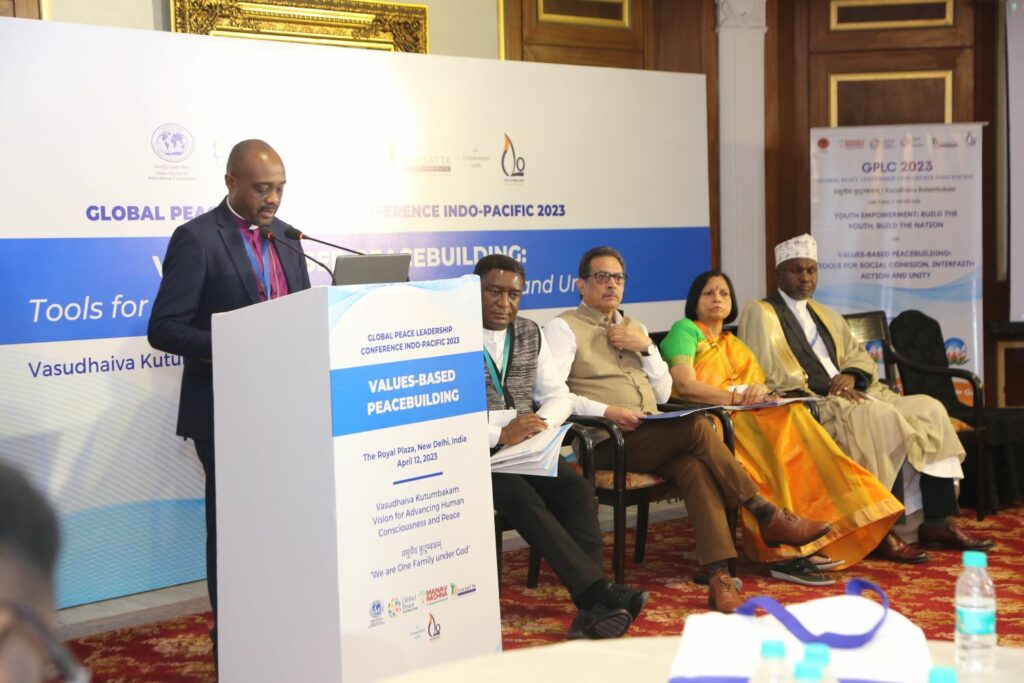
Bishop Sosthenes Jackson, Head of the Anglican Church of Dar es Salaam and General Secretary of Peace Committee Tanzania, said religious leaders play a powerful role in shifting attitudes opinions and behavior and have a unique and important role in advising and peacebuilding.

Session II moderator Aishwarya Chaturvedi, Assistant Professor Jindal Global Law School and Global Peace Women Project Leader (left) and Dr. Syed Mohammad Sajid, Professor, Department of Social Works, Jamia Millia Islamia.
Prof. Asha Shukla, Former Vice Chancellor at Ambedkar University, served as chair of the session and Rev. Fr. Canice Chinyeaka Enyiaka served as moderator. Session II speakers included Bishop Jackson Sosthenes Jackson, Head of the Anglican Church of Dar es Salaam and General Secretary of Peace Committee Tanzania; Dr. Syed Mohammad Sajid, Professor at the Department of Social Works at Jamia Millia Islamia, India; and Sheikh Waiswa Muhammed Ali, Deputy Mufti of Uganda.
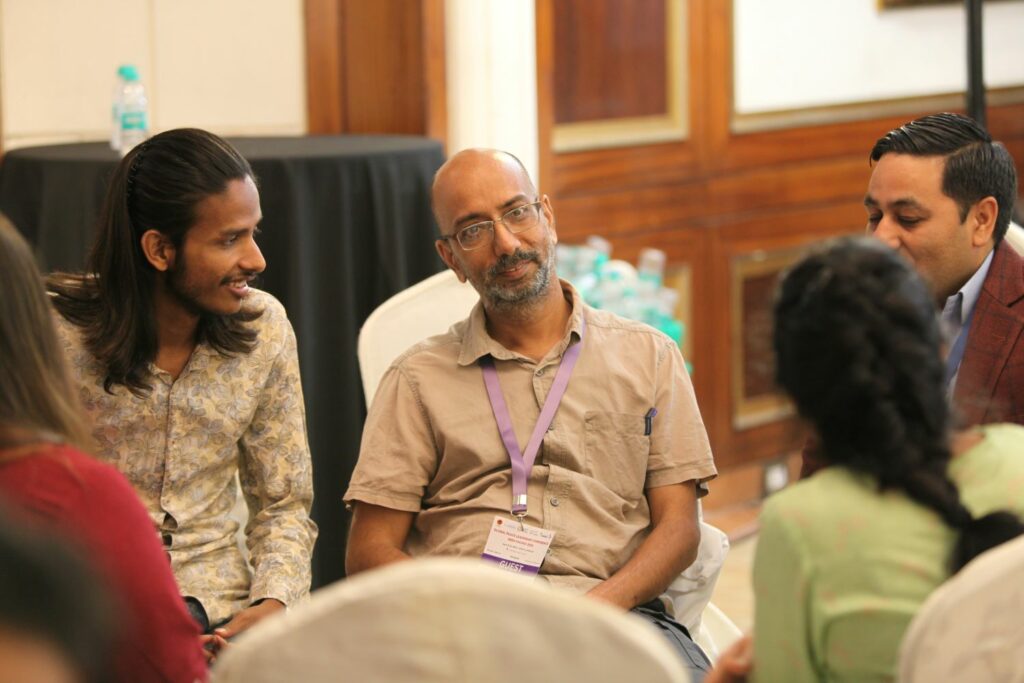
SESSION III: Youth Empowerment & Values-based Peacebuilding: Let’s All be Peacebuilders!
Young peacebuilders can play a leadership role in activating innovative new peacebuilding approaches, preventive diplomacy, community training, and local capacity building in their communities. In contrast, the focus on unity within diversity, the shared identity of our common humanity, and the shared values that accompany that identity can bring transformation and respect for all. This session demonstrates the principle that acts of service or volunteering are a powerful tool for peacebuilding.
This combined Youth and Peacebuilding session worked to devise a strategy for a collaborative peace movement for all ages in India, advancing the Global Peace Foundation’s Peace Hub Campaign, coupled with the continuing program of the Global Peacebuilders Practicum. The Chairperson of this combined session was Aditi Naryani Paswan, Y-20 Youth Leader. Rumit Walia, Senior Program Officer of GPF-India, served as moderator, and Rahmi Utami, General Manager, GPF Indonesia, supported the session as facilitator.
“Instead of paying so much time and attention to the theological aspects of religious dialogue, we need to give more focus on practiced ‘lived’ religion.” —Dr. Syed Mohammad Sajid
Session III panelists included Assistant Prof. Aishwarya Chaturvedi, Jindal Global Law School and Project Leader, Global Peace Women; Gail Hambleton, Senior Program Specialist, Values-based Peacebuilding, GPF International; and Sharleen Tomobe, Program Development Coordinator, GPF International.
The Peacebuilding Track at the GPLC concluded on a high note, being joined by the Youth Track in announcing the launching of the PeaceHub Campaign. This was also cited in the action agenda of the inspirational New Delhi Declaration.
Two of our Session III Speakers, Aditi Naryani Paswan, (Y-20 Youth Leader, Track Chair) Peacebuilding and Reconciliation, and Rimjhim Gour, (also working with the C-20) expressed deep interest in the Peace Hub Campaign and the desire to work together for Peace in India and the Indo-Pacific.

Gail Hambleton, Senior Program Specialist, Values-based Peacebuilding, GPF International, and Sharleen Tomobe, Program Development Coordinator, GPF International during Session 3, Right: Shintya Rahmi Utami, General Manager, GPF Indonesia.


